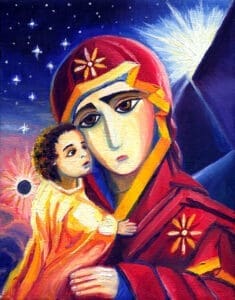What Mother Mary heard from the cross
By LORRAINE V. MURRAY, Commentary | Published March 11, 2024
We often picture the crucifixion as a silent and peaceful time. Perhaps this is because we gaze upon the crucifix at church in a serene setting. In fact, while Christ was on the cross, chaos broke out. We can imagine people in the crowd jostling with each other to get a good view of the spectacle. Some were shouting, “Save yourself by coming down from the cross.” One of the thieves crucified near Jesus was cursing him.
Add to this the weeping of his mother and the other women gathered beneath the cross. Perhaps we imagine them standing there with John in silence, but what mother, what aunt, what friend of a man dying in agony wouldn’t be beseeching God to stop this brutality?
 In reading the last words Jesus spoke to the world, I found myself imagining what was in his mother’s heart. How stunned the crowd must have been to hear the opening statement. Not words of condemnation, not words of hatred and malice, but mercy. “Father, forgive them, for they know not what they do.” He was forgiving Herod, Pilate, Caiaphas, the soldiers, the crowd that had screamed “Crucify him!” His mother wouldn’t have been surprised by his message because she knew his teachings. “Love your enemies, do good to those who hate you, pray for those who mistreat you.”
In reading the last words Jesus spoke to the world, I found myself imagining what was in his mother’s heart. How stunned the crowd must have been to hear the opening statement. Not words of condemnation, not words of hatred and malice, but mercy. “Father, forgive them, for they know not what they do.” He was forgiving Herod, Pilate, Caiaphas, the soldiers, the crowd that had screamed “Crucify him!” His mother wouldn’t have been surprised by his message because she knew his teachings. “Love your enemies, do good to those who hate you, pray for those who mistreat you.”
A short conversation takes place among Jesus and the two thieves. One mocks him, but the other defends him before uttering a prayer: “Remember me when you come into your kingdom.” His mother might have recalled Jesus’ words: “Unless you change and become like little children, you will never enter the kingdom of heaven.” Now the thief is like a helpless child, fully trusting God in his hour of death. Jesus’ answer to the man’s prayer comes quickly: “Today you will be with me in paradise.”
How moved the Blessed Mother surely was, when Jesus showed his deep love for her in his final moments: “Woman, behold your son.” John was given the enormous responsibility of caring for the woman who, for decades, had pondered Simeon’s words, “You yourself a sword shall pierce.” As she witnessed her son’s death and the sword was plunged into Mary’s heart, Jesus ministered to her. “Behold, your mother,” he tells John.
From noon until 3 o’clock, the sky darkened, as the one called the Light of the World was slowly dying. The grayness echoes the heart-wrenching cry from the cross: “My God, my God, why have you abandoned me?” These are the words from every person who has ever asked God, “Why is this happening?” His mother would recognize Jesus’ cry from Psalm 22, which describes a persecuted man who eventually triumphs. She also might recall her question to her boy after he was missing three days: “Son, why have you done this to us?”
Jesus’ cry of “I thirst” could have filled Mary with memories. She had fed the infant at her breast. She had brought him water when he was a little boy. What pain for a mother to be unable to slake her son’s thirst! For Mother Teresa, Jesus’ words expressed a deeper meaning, a thirst for souls. Even as he is dying, Jesus wants to bring people to heaven.
“It is finished,” Jesus said and bowed his head. He had fulfilled his mission, which was giving eternal life to believers. His mother might recall his words in the temple: “I must be about my Father’s business.” Having completed his Father’s business, he utters his last words: “Into thy hands I commend my spirit.” The earth quakes, the sun’s light is snuffed out and the curtain of the temple is torn in two.
The centurion and the men with him are struck with fear, as they realize the truth. The crowd of onlookers leaves the scene “beating their breasts,” a sign of repentance. In his great mercy, Jesus had forgiven them for their cruelty and converted their hearts. They would go home and spread the word: “Truly, this man was the Son of God!”
Artwork is by Lorraine’s late husband, Jef (www.jefmurray.com). Her email address is lorrainevmurray@yahoo.com.